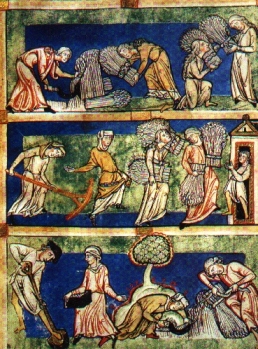
Faith and marvels in Daily Medieval Life
A unique characteristic of Christian faith during Middle Ages was the deep bound between daily life and faith. Faith was not lived as a private matter or as a fact connected with specific occasions but was an integral facet of daily life. Fear of war, famine or epidemics, the very precariousness of life bound medieval man more to faith. The prophecy of Parusia is relevant during these times especially during the millennium passage, and the predication of Joaquin of Fiore increases this fear. Next to sincere faith and religious practice survive ancestral religious cultures and superstitions as do numerology, astrology, religious or occult influences on geometrical forms, on plants or on animals. An illustrate victim, for example, of this kind of contradict relation with the unknown, with the different of us, in a culture male dominated, would be the woman, fairy and witch, holly and source of temptation together.
Perhaps the deepest expression of popular faith is the sense of penitence, in sharing passion, in the construction of cathedrals and churches as an expression of faith or of repentance. On the land the rhythm of work on the fields changes between prayers,

as if by the benedictian’s spirit of “ora et labora” : If prayers are the solemn moments of contact with God, and it is often rich in visions and miracles, work is the painful part, the penitential part of prayer, but not less agreeable to God. Life is therefore lived in this kind of dimension of continuous contact with the divine and wondrous. Sunday Mass becomes compulsory from the VIth Century. The Eucharist is seldom approached because of fear of sin. Penitence is often solemn and clamorous just as are conversions and passions. We may recall the great love of the great philosopher Abelard and the young pupil Eloise who later becomes a noon; or the love of Dante for Beatriz, married to another, or the story of Eleanor of Aquitaine, first wife of Louis VII, king of France and then of Henry II Plantagenet, king of England. All this is lived in harmony with faith, not opposed to it, as is now common to us children of the French Revolution.
